At this point the question is not whether the popularity of Neverland will (shounen) jump, but “how high”.
 There are many ways one might try to measure the popularity and/or commercial success of an anime. Context matters of course. While disc sales are an increasingly smaller component across the board every year, they’re always been less important for marquee WSJ adaptations like Yakusoku no Neverland. With this sort of series manga sales are as good an indicator as any, and this week’s Oricon rankings tell you all you need to know. No less than 22% of them (11 out of 50 slots) belong to this series. Every back issue is ranking again. That’s what major hits behave like – and the sky’s the limit for The Promised Neverland.
There are many ways one might try to measure the popularity and/or commercial success of an anime. Context matters of course. While disc sales are an increasingly smaller component across the board every year, they’re always been less important for marquee WSJ adaptations like Yakusoku no Neverland. With this sort of series manga sales are as good an indicator as any, and this week’s Oricon rankings tell you all you need to know. No less than 22% of them (11 out of 50 slots) belong to this series. Every back issue is ranking again. That’s what major hits behave like – and the sky’s the limit for The Promised Neverland.
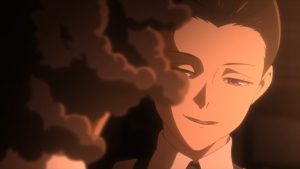 It must be said that while Kanbe Mamoru and his team aren’t changing much, there can be no question now that Sister Krone’s character is among the biggest departures. Read the manga (which you should anyway, it’s good) and you’ll see – they’ve made her almost a comic relief character here, but that’s not how she comes off in print. She’s cocky and ambitious to be sure, but not nearly so much the clown (and she keeps her thoughts internal for the most part). That this is the character – one whose physical design was already offensive to some – the anime chose to take this route with raises obvious concerns. But above and beyond that, I’m not sure defanging what should be one of the principal antagonists in this arc serves the narrative well.
It must be said that while Kanbe Mamoru and his team aren’t changing much, there can be no question now that Sister Krone’s character is among the biggest departures. Read the manga (which you should anyway, it’s good) and you’ll see – they’ve made her almost a comic relief character here, but that’s not how she comes off in print. She’s cocky and ambitious to be sure, but not nearly so much the clown (and she keeps her thoughts internal for the most part). That this is the character – one whose physical design was already offensive to some – the anime chose to take this route with raises obvious concerns. But above and beyond that, I’m not sure defanging what should be one of the principal antagonists in this arc serves the narrative well.
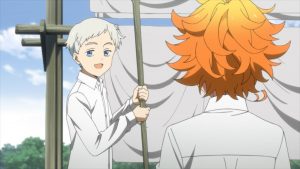 That said, it’s obvious that Mama is plenty creepy and smart enough to carry the load – I just wish she didn’t have to quite so much. One has to have a certain suspension of disbelief to begin with to accept 11 year-olds acting the way these kids do in these circumstances, but once you get there you realize that the challenges facing the trio have to be formidable because so are they. There’s a constant battle of wits (and wills) going on here between Isabella and the big three (especially Norman), a cat-and-mouse game that’s so symbolically on the nose that it’s almost literal.
That said, it’s obvious that Mama is plenty creepy and smart enough to carry the load – I just wish she didn’t have to quite so much. One has to have a certain suspension of disbelief to begin with to accept 11 year-olds acting the way these kids do in these circumstances, but once you get there you realize that the challenges facing the trio have to be formidable because so are they. There’s a constant battle of wits (and wills) going on here between Isabella and the big three (especially Norman), a cat-and-mouse game that’s so symbolically on the nose that it’s almost literal.
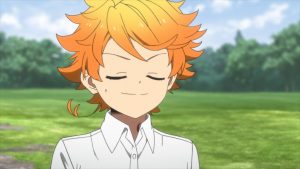 The decision to bring Don (Ueki Shinei, as far as I can tell a newcomer) and Gilda (Lynn) in on the truth is a major twist in the plot. As is usually the case to this point it’s Norman who instigates the action, and it’s he who chooses to keep the whole truth from them. This irritates Ray to no end, but Norman sees it as a practical necessity to take the path of least resistance at this point. If the notion of escape is going to become a reality everyone will have to be brought in sooner or later, and a wrong turn at this point would be disastrous. Norman also lays a trap to determine who the snitch might be – he informs Ray that he’s told Don the escape ropes are under his bed, and Gilda that they’re hidden in the bathroom ceiling.
The decision to bring Don (Ueki Shinei, as far as I can tell a newcomer) and Gilda (Lynn) in on the truth is a major twist in the plot. As is usually the case to this point it’s Norman who instigates the action, and it’s he who chooses to keep the whole truth from them. This irritates Ray to no end, but Norman sees it as a practical necessity to take the path of least resistance at this point. If the notion of escape is going to become a reality everyone will have to be brought in sooner or later, and a wrong turn at this point would be disastrous. Norman also lays a trap to determine who the snitch might be – he informs Ray that he’s told Don the escape ropes are under his bed, and Gilda that they’re hidden in the bathroom ceiling.
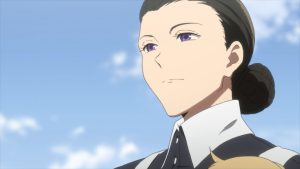 Emma, naturally, hates the idea of suspecting anyone – which Ray harshly scolds her for – especially Gilda, with whom she’s obviously close. And it seems as if Gilda might in fact be the rat, as she sneaks out that night – but it’s to talk to Krone, not Isabelle, and it was clearly Krone who initiated the contract. But Gilda doesn’t take the bait Krone clumsily dangles in front of her, staying true to her friends. Still, the ropes are gone from under Norman’s bed the next day. His trap has been sprung, and it snared exactly who he expected – as painful as that reality is for him.
Emma, naturally, hates the idea of suspecting anyone – which Ray harshly scolds her for – especially Gilda, with whom she’s obviously close. And it seems as if Gilda might in fact be the rat, as she sneaks out that night – but it’s to talk to Krone, not Isabelle, and it was clearly Krone who initiated the contract. But Gilda doesn’t take the bait Krone clumsily dangles in front of her, staying true to her friends. Still, the ropes are gone from under Norman’s bed the next day. His trap has been sprung, and it snared exactly who he expected – as painful as that reality is for him.
 Once more Kanbe-sensei pushes the auteur envelope right up to the edge of pretentiousness a couple of times, but manages to stay on the right side of it. His perspective shots are quite arresting, but the main standout on the production side here is the fantastic degree of tension than hangs in the air throughout the entire episode – and the sound design is a big part of that. “Paranoia” is definitely the theme here – suspecting those we love of betraying us, even as the clock is ticking both symbolically (that sound design) and literally. Maybe Kanbe thought something was needed to offer up a counterpoint to all that foreboding and anxiety, and that was his thinking with Sister Krone. But I’d just as soon embrace it full-on and have every menacing person in the cast be as menacing as they possible can be – I think audiences can take it.
Once more Kanbe-sensei pushes the auteur envelope right up to the edge of pretentiousness a couple of times, but manages to stay on the right side of it. His perspective shots are quite arresting, but the main standout on the production side here is the fantastic degree of tension than hangs in the air throughout the entire episode – and the sound design is a big part of that. “Paranoia” is definitely the theme here – suspecting those we love of betraying us, even as the clock is ticking both symbolically (that sound design) and literally. Maybe Kanbe thought something was needed to offer up a counterpoint to all that foreboding and anxiety, and that was his thinking with Sister Krone. But I’d just as soon embrace it full-on and have every menacing person in the cast be as menacing as they possible can be – I think audiences can take it.


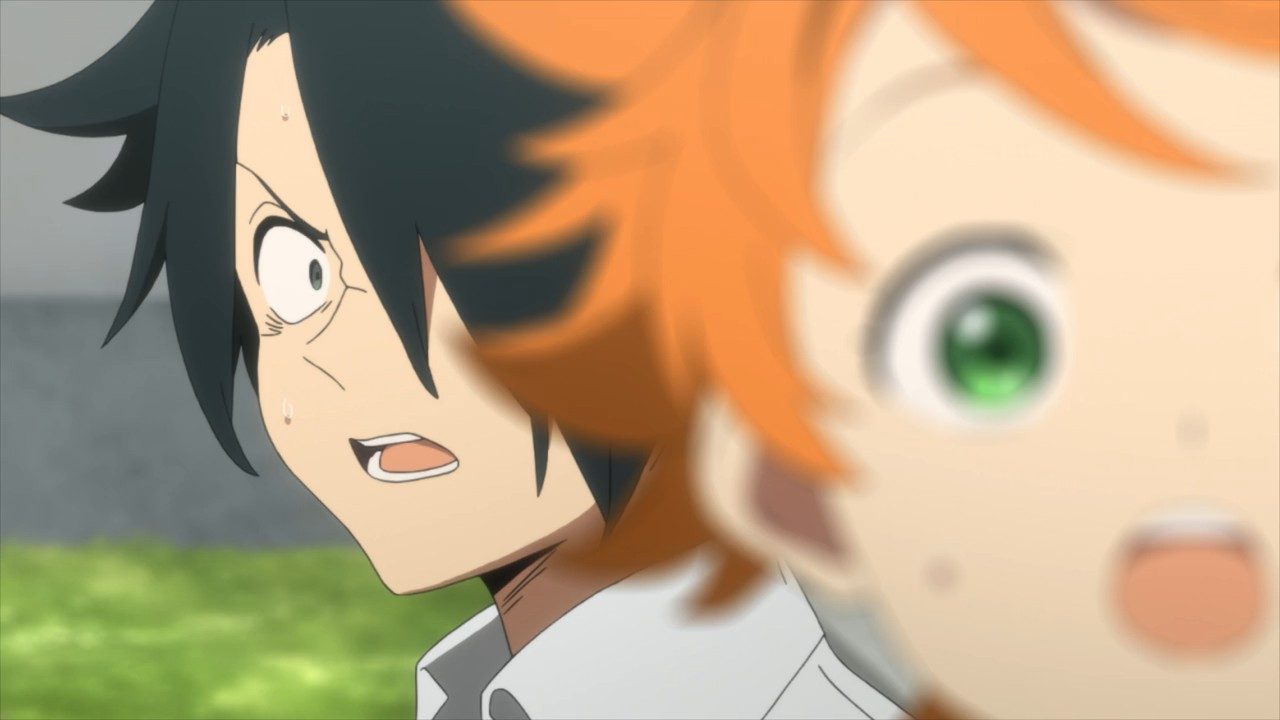
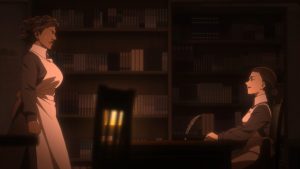
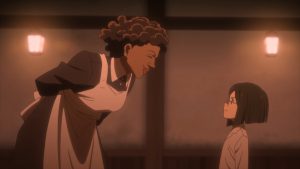
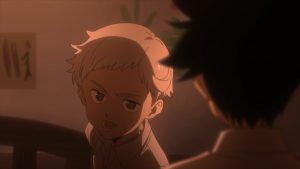
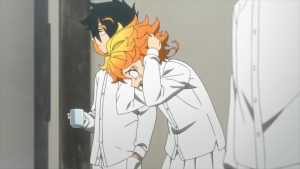

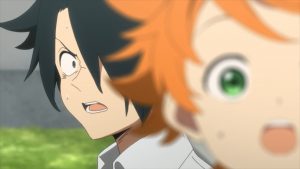
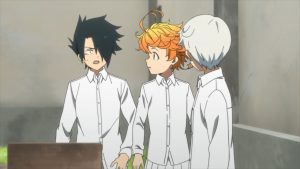
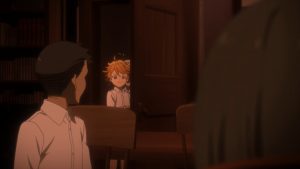
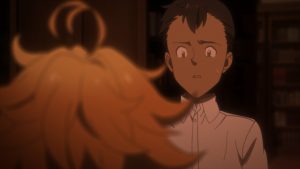
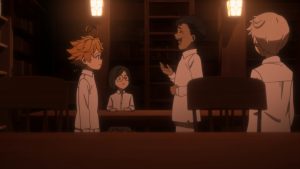
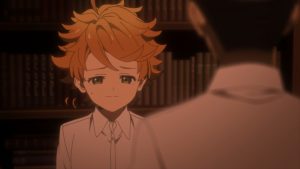
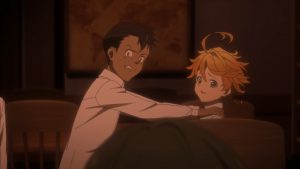

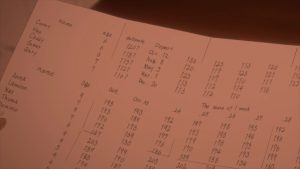
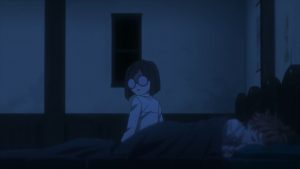

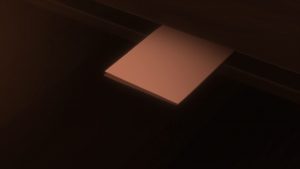

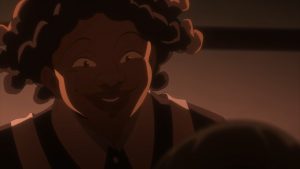
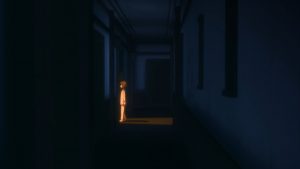
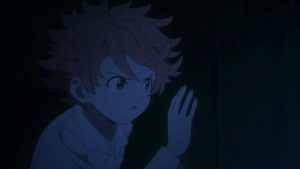
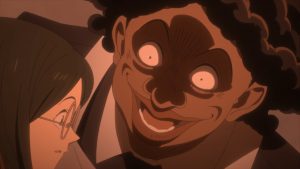

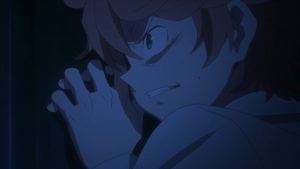

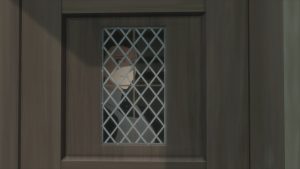
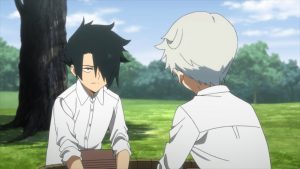

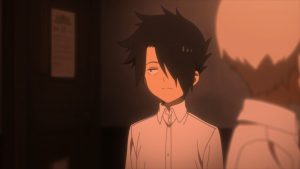

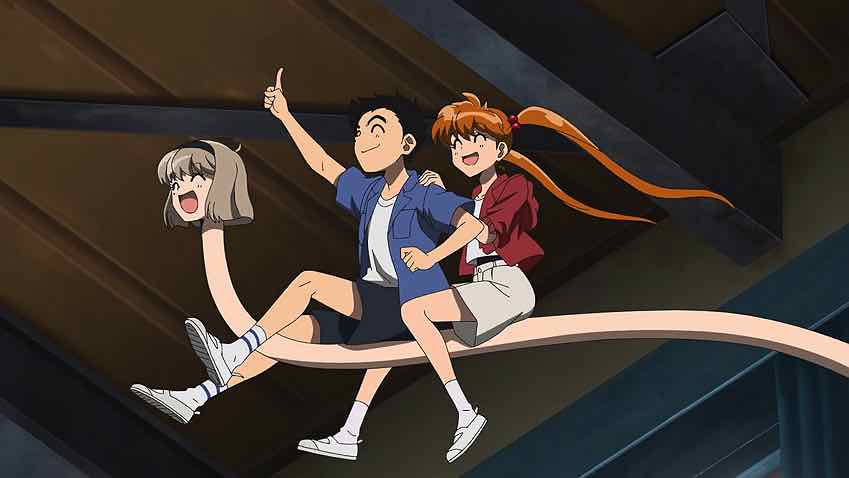
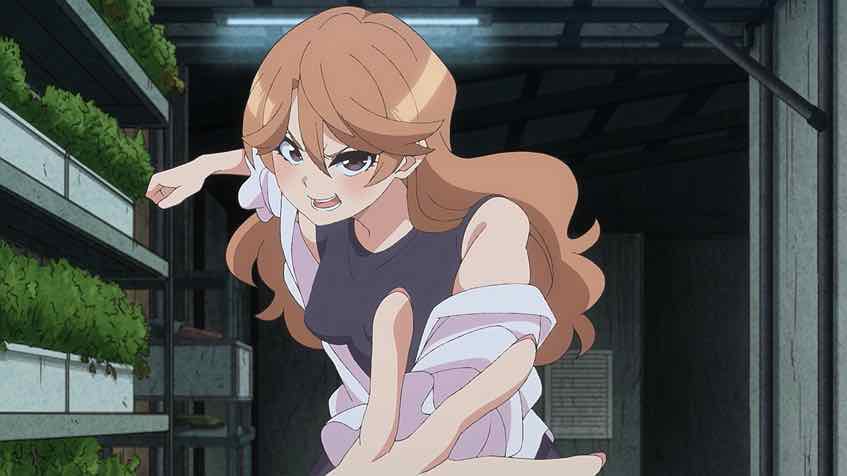
Miyu Fan
February 1, 2019 at 11:21 pmWith Ray as the traitor (assuming it’s true because I haven’t read the manga), I felt like Norman are pulling too much heavy emotional baggages in this plan for Emma’s sake. My mind kept thinking on the emotional fallout with Ray as the traitor. I don’t know the extent of how heartless/ruthless can Norman be, but this will certainly affect him, and with all these secrets and lies keep piling up I dread to think the potential lashback of all these to Norman. Hopefully he told Emma the truth about Ray but I still can imagine he’s not telling her because he doesn’t want Emma to be sad.
Guardian Enzo
February 1, 2019 at 11:49 pmI can’t respond to any of that, sadly…
Miyu Fan
February 2, 2019 at 12:09 amHaha I know you can’t, I’m planning to read the manga after the anime is finished (cause who knows when the second season will come) but I really need to held back myself from reading the manga now so I can enjoy the anime fully. The anime does the job well with the psychological drama, mystery and characters (Norman is my favourite) that I can’t wait for the second season to come first. Contrast that with Attack on Titan which the anime really killed my curiosity on what’s in the basement that I still haven’t read the manga and just patiently waiting for the anime lol.
King Wombo Jr
February 2, 2019 at 6:12 amWonderful write up as always, and THANK YOU for calling out how they’re adapting Krone here.
That aspect partially pisses me off because Krone remains, to this day, my favorite character in TPN, and it’s really upsetting seeing them treat her in such a degrading manner, ESPECIALLY with that goofy-ass soundtrack playing whenever she’s around. It immediately takes away all tension and danger from her scenes when playing.
~
What’s crazy is I am a starch defender of the manga writers’ intentions with Krone as a character over an offensive stereotype (the artist does actually tone down on Krone’s design as the story progressed, to the point where she looks like an actual human), but here with her now solely playing the fool and that stupid music…well, she definitely comes across as much more of an offensive stereotype in the anime.
Guardian Enzo
February 2, 2019 at 9:33 amYeah, that bit of BSM they played when Krone was in her room after Isabella humiliated her was an affront to all that’s decent and noble in the multiverse. Just sums up what they’re doing to her character.
hgfdsahjkl
February 2, 2019 at 6:16 am(( One has to have a certain suspension of disbelief to begin with to accept 11 year-olds acting the way these kids do in these circumstances))
why is that ?actually those kids remind me so much of killua,
if one accepts that concept generally in anime,why mentioning it here
Guardian Enzo
February 2, 2019 at 9:35 amKillua is an odd comparison to me for a couple of reasons. First he’s older (by about 2 years, which matters). And second, he’s been training on how to he a soulless killer since he was 6 years old.
kiwi
February 3, 2019 at 3:10 pmIn the manga, was Krone like…. dangerous and unstable? Or just plain dangerous? (and less of the comic-relief type thing)
Because I agree that the way that she is portrayed here is a little… annoying (at the least).
That said, the scene with her and Gilda was still a bit nerve-wracking.
Guardian Enzo
February 3, 2019 at 5:48 pmShe’s dangerous, a bit cocky – but not the buffoon she is here. She’s quietly clever when she needs to be. And she doesn’t talk to herself or play with dolls.
Kurik
February 3, 2019 at 8:31 pmI am with you on the direction they seemingly have taken. I would prefer her to be more menacing as you stated in the manga as the audience can take it. Lets hope they dial down the silliness in the coming episodes. I want her to be a proper challange to Mom and at this point she doesn’t appear to be.